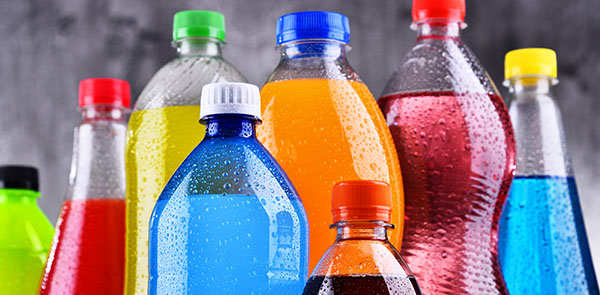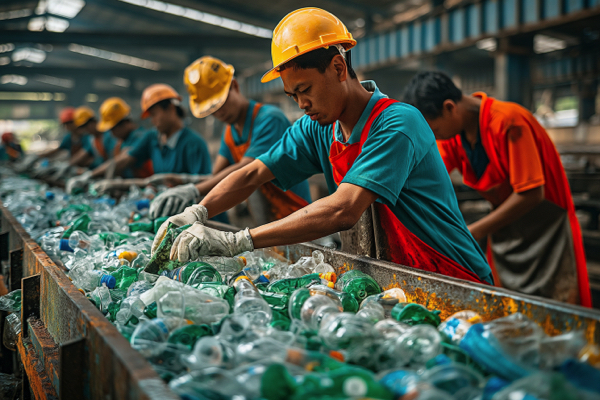Recycled plastics are a nightmare concoction of BPA and phthalates, but recycling makes a great cover story for “greenwashing” the plastics industry
08/29/2024 / By Lance D Johnson

Keeping plastic bottles out of the landfills and waterways is a conscious, sustainable pursuit; however, these plastic chemicals are often recycled into new packaging materials, creating an unknown blend of synthetic chemicals that leech into the food supply, harming human health. While trying to protect the environment, we may inadvertently be harming ourselves, and the regulatory agencies are asleep at the wheel on the issue.
The U.S. Food and Drug Administration (FDA) is facing mounting criticism over its lack of oversight concerning the recycled plastics that are used in new food packaging. Researchers warn that chemical companies are practically regulating themselves, incorporating a nightmare concoction of phthalates and BPA into recycled plastics. Unknown combinations of synthetic chemicals are being intermixed into new food packaging materials, ensuring that the current food supply is full of endocrine-disrupting carcinogens. To make matters worse, the FDA’s approval process does not adequately safeguard against the potential risks of toxic chemicals leaching into food products.
FDA’s review of recycled plastics is a voluntary process that allows companies to do whatever they want
Since the early 1990s, the FDA has approved over 340 voluntary applications for food contact materials made from recycled plastics, with the number of approvals increasing significantly in recent years. Approvals for recycled plastic products have tripled since 2019, going from 7-8 approvals per year prior to 2019 to an average of 23 approvals per year since.
For example, major companies like Coca-Cola and General Mills have adopted recycled plastics for their products, including Coca-Cola’s 100% recycled PET (polyethylene terephthalate) bottles and General Mills’ Annie’s cereal boxes with 35% recycled plastic liners.
Companies that seek approvals include some of the biggest petrochemical companies around, including Eastman Chemicals, DuPont and Indorama. These manufacturers, along with companies from India and China, exert significant influence over regulators, especially when so much money is put into plastic recycling in the first place. Moving new products in the cheapest recycled plastic is the ultimate goal, as companies want to appear sustainable, while reaping max profits.
This is why the FDA’s approval process for these materials has been criticized for its lack of rigor and transparency. Unlike other regulatory processes, the FDA’s review of recycled plastics is voluntary, meaning companies are not required to submit comprehensive safety data or undergo mandatory testing unless they choose to. The FDA’s reliance on industry-provided data is insufficient for identifying potential health hazards.
Recycled plastics are a BPA and phthalate nightmare
Researchers have pointed out that recycled plastics may contain a cocktail of toxic chemicals that may leach into food products. Studies indicate that recycled PET, commonly used in bottles, can harbor substances like bisphenol-A (BPA), phthalates and other hazardous chemicals at higher levels than virgin PET. These substances are linked to various health issues, including endocrine disruption, cancer and developmental problems.
Dr. Maricel Maffini, a scientist with Environmental Health News, argues that the FDA’s approach to approving recycled plastics is “very lax.” The agency primarily concerns itself with pathogen contamination rather than the complex chemical mixtures present in recycled materials.
The recycling process itself introduces additional complexities. Recycled plastics are often collected from mixed sources, including potentially hazardous items like pesticide containers. Furthermore, the degradation of plastics during recycling may necessitate the addition of stabilizers and other chemicals, increasing the risk of harmful substances leaching into food.
FDA spokesperson Enrico Dinges, defends the agency’s review process for having “stringent scientific guidelines” and says the agency has the capability to conduct spot tests if necessary. However, Professor Tom Zoeller from the University of Massachusetts Amherst says the FDA’s approach is outdated, noting that its safety standards are based on evaluating single chemicals rather than the complex mixtures found in recycled plastics. Zoeller and others suggest that the FDA should adopt more modern testing methodologies that consider endocrine-disrupting chemicals and the cumulative effects of chemical exposures.
Learn more about the effects of endocrine disrupting chemicals on human physiology:
Sources include:
Submit a correction >>
Tagged Under:
big government, BPA, cancer criminals, carcinogens, Chemical companies, clean food watch, endocrine disrupters, FDA, food supply, green living, grocery, pesticide residues, phthalates, poison, products, Public Health, recycled plastics, stop eating poison, sustainability, toxic chemicals, toxic ingredients, toxins
This article may contain statements that reflect the opinion of the author




















